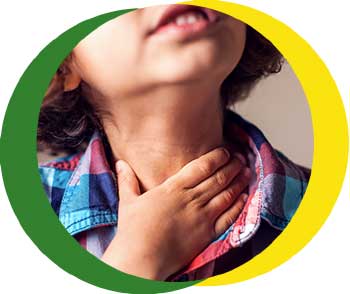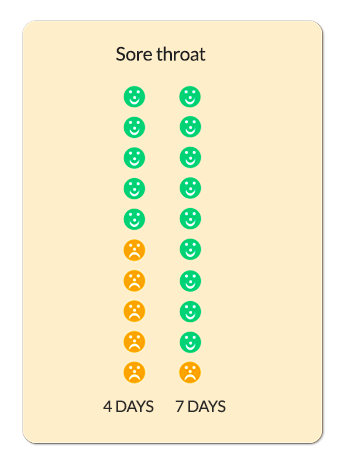Sore throat

Sore throats are extremely common, and are often associated with a high temperature.
- Most sore throats are caused by viral infections – if this is the case, your child is likely to also have a runny nose, cough or earache
- If a number of people are unwell in the same household, this also suggests a viral infection (because viral infections are easily spread)
- Viral infections tend to get better on their own and do not need treatment with antibiotics. Antibiotics may actually cause side effects such as rash and diarrhoea and can increase the risk of them developing antibiotic resistance.
When should you worry?
If your child has any of the following:
- Is going blue around the lips
- Becomes pale, mottled and feels abnormally cold to touch
- Has a fit / seizure
- Seems dehydrated (sunken eyes, drowsy or not had a wee or wet nappy for 12 hours)
- Becomes extremely agitated (crying inconsolably despite distraction), confused or very lethargic (difficult to wake)
- Develops a rash that does not disappear with pressure (the ‘Glass Test’)
- Is under 3 months of age with a temperature of 38°C / 100.4°F or above (unless fever in the 48 hours following vaccinations and no other red or amber features)
- Is between 3-6 months of age with a temperature over 39°C
You need urgent help
Go to the nearest Hospital Emergency (A&E) Department or phone 999
If your child has any of the following:
- Is unable to swallow their own saliva
- Is having difficulty opening their mouth
- Is have breathing problems, such as rapid breathing, shortness of breath or laboured breathing (drawing in of muscles below the lower ribs when they breath in)
- Seems dehydrated (sunken eyes, drowsy or not had a wee or wet nappy for eight hours)
- Is becoming drowsy (excessively sleepy) or irritable (unable to settle them with toys, TV, food or picking up) – especially if they remain drowsy or irritable despite their fever coming down
- Has extreme shivering or complains of muscle pain
- Is 3-6 months of age with a temperature of 39°C / 102.2°F or above (but fever is common in babies up to 2 days after they receive vaccinations)
- Continues to have a fever of 38.0°C or above for more than 5 days
- Is getting worse or if you are worried
You need to contact a doctor or nurse today
Please ring your GP surgery or call NHS 111 – dial 111
We recognise that during the current COVID-19 crisis, at peak times, access to a health care professional may be delayed. If symptoms persist for 4 hours or more and you have not been able to speak to either a member of staff from your GP practice or to NHS 111 staff, then consider taking them to your nearest Emergency Department
If none of the above features are present
Additional advice is also available to young families for coping with crying of well babies – click here
Self care
Continue providing your child’s care at home. If you are still concerned about your child, call NHS 111 – dial 111
What should you do?
- To make your child more comfortable, you may want to give them paracetamol (calpol) and/or ibuprofen as per the instructions on the packaging. This not only helps with fever but also reduces pain
- Most children with coughs/colds do not require treatment with antibiotics. Antibiotics rarely speed up recovery and often cause side effects such as rash and diarrhoea. They will also promote the development of antibiotic resistant bacteria in your child
- If your child has a fever for more than 3 days and doesn’t seem to be getting any better, you should take them to see your GP
How long will your child’s symptoms last?
- The chart below shows how long sore throats take to get better in children. The faces represent 10 children who have seen their GP with a sore throat. Green faces are those children whose sore throat has got better within that time period
- After a week, more than three-quarters of those with a sore throat will be better whether they take antibiotics or not. Most (13 out of 14) who take antibiotics will get better just as quickly as if they hadn’t taken them.

Where should you seek help?
- If it is non-urgent, speak to your local pharmacist or health visitor.
- If your child has any of the above features, urgently see your GP. For an urgent out-of-hours GP appointment, call NHS 111.
- You should only call 999 or go your nearest A&E department in critical or life threatening situations.

